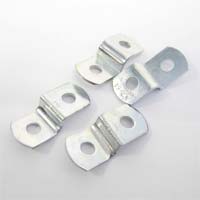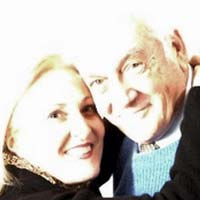| Glossary Of Giclee Terms
[7] |
O
OBA Optical brightening agents.
A class of chemicals that absorb light energy in one spectrum and emit it in another. When applied to white paper, an OBA can lessen a yellowed appearance. Also called "fluorescent lightening agents", it is applied to some fine art papers to create the bright white often desired. Whether or not OBAs have an archival lifespan is still contested. |
Offset Clips Used to affix a stretched canvas to a frame. Also known as a âZ bracketâ, this stepped metal hardware has a hole in either end through which a screw or nail is driven. One end of the bracket is fastened to the stretcher bar frame, the other to the back of the picture frame. Offset clips allow for artwork that is slightly larger or smaller than the depth of the frame rabbet to be fitted. They are also used to attach a canvas to a floater frame.
Order online: Offset Clips |
 |
Offset Printing Offset printing, also known as offset lithography, is a widely used printing technique in which ink is transferred from a printing plate to a rubber blanket cylinder and then onto the printing substrate, typically paper. Offset printing is based on the principle of oil and water repulsion, where the image areas on the printing plate attract ink, while the non-image areas repel ink.
Offset printing is capable of producing high-quality prints with sharp detail, vibrant colors, and consistent results, making it suitable for a wide range of applications, including newspapers, magazines, books, packaging, and marketing materials. Offset printing offers advantages such as fast printing speeds, cost-effectiveness for large print runs, and compatibility with a variety of paper stocks and finishes. |
Opacity Opacity refers to the degree to which a material or substance blocks the transmission of light or allows objects behind it to be obscured or concealed. In the context of printing, opacity is an important property of paper, ink, and other printing materials that affects the visibility and legibility of printed text, images, and graphics. Opacity is typically expressed as a percentage, with higher opacity indicating greater light-blocking ability and less see-through or show-through of underlying layers.
Opacity is influenced by factors such as paper thickness, weight, and composition, as well as ink coverage, color density, and printing process. High-opacity papers are preferred for double-sided printing, where text and images must remain legible without interference from content printed on the reverse side. |
Open edition prints An open edition print has no limit to the number of copies made. While a limited edition print has a set number - 10, 50, or 1000, for instance, after which time no more copies will be made - open edition implies the artist can continue making prints indefinitely.
As a result, open edition prints are generally cheaper than limited editions, and will not amass the same value over time.
|
 |
Overexposed In photography, exposure relates to the amount of light that was allowed to affect the image, either through the viewfinder of the camera, or in the darkroom during film development.
An overexposed image will have more light than average (generally considered too much, though some artists deliberately overexpose their images). Overexposure tends to make an image whiter, obscuring details in areas that were already well lit.
For example, if the subject is in front of a bright light, the background often must be overexposed in order for the subject's face to be visible.
|
 |
| Overlap Similar to "offset", this refers to the amount of the artwork a picture frame lip or mat will cover on each side of the piece. An overlap is necessary to keep the contents behind from falling through the opening. |
|
© 2002-2026 - KeenART Media Ltd.
|
|
| |
|

